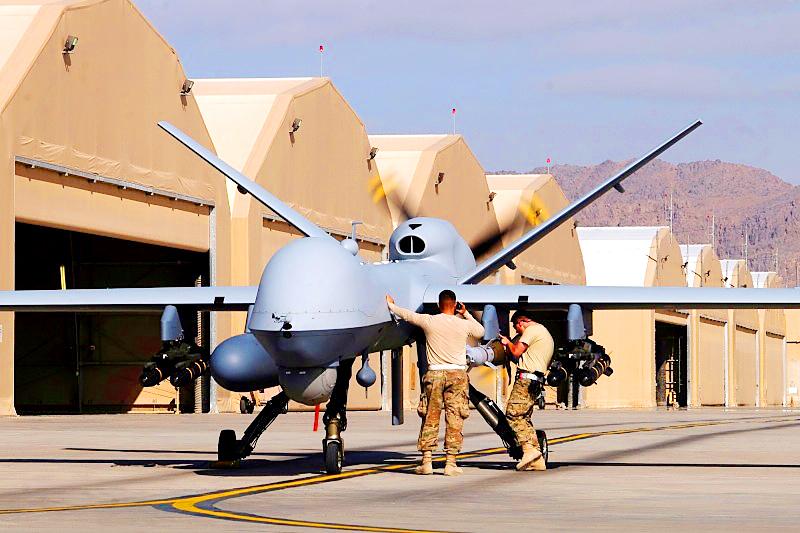The government yesterday welcomed Washington’s announcement that it would sell Taiwan MQ-9B drones, which are expected to boost the nation’s large-scale maritime reconnaissance and asymmetric combat capabilities.
The US Defense Security Cooperation Agency on Tuesday said that it had notified the US Congress of the possible sale to Taiwan of four Weapons-Ready MQ-9B Remotely Piloted Aircraft and related equipment for an estimated cost of US$600 million.
Also included were MX-20 Multi-Spectral Targeting Systems and spares, SeaVue Maritime Multi-Role Patrol Radars, and SAGE 750 Electronic Surveillance Measures Systems, C-Band Line-of-Sight Ground Data Terminals, personnel training and training equipment, it said.

Photo: Reuters
General Atomic Aeronautical System would be the principle contractor, it added.
Including the new package, the US government has announced three arms sales to Taiwan in two weeks, showing that Washington continues to fulfill its commitment to the Taiwan Relations Act and the “six assurances” with concrete action, Presidential Office spokesman Xavier Chang (張惇涵) said yesterday.
The drones would upgrade the military’s round-the-clock reconnaissance and asymmetric combat capabilities, Chang said.
They would allow the military to conduct large-scale maritime patrols and reconnaissance, and, in wartime, identify the positions of the enemy, Association of Strategic Foresight research fellow Chieh Chung (揭仲) said.
For example, when China conducts drills in the western Pacific, Taiwan could employ the drones to collect information, which would be more efficient than crewed aircraft that require considerable maintenance, he said.
It is significant that the drones are equipped with both reconnaissance and combat capabilities, as indicated by the “weapons-ready” wording in the announcement, said Su Tzu-yun (蘇紫雲), a senior analyst at the government-funded Institute for National Defense and Security Research.
That shows the improved mutual trust between Taiwan and the US in the face of a rising Chinese threat, as the US usually sells drones with only reconnaissance functions, he said.
The sale would assist Taiwan’s development of indigenous aircraft, especially as the Chungshan Institute of Science and Technology is also developing drones, he added.
In Beijing, Chinese Ministry of Foreign Affairs spokesman Wang Wenbin (汪文斌) yesterday said that Washington’s arms sales to Taiwan contravene the “one China” principle, as well as the three joint communiques between China and the US.
He called on the US to scrap the arms sales to avoid further damaging China-US relations and cross-strait stability, adding that China would implement the requisite responses after following developments.
Additional reporting by CNA

LONG FLIGHT: The jets would be flown by US pilots, with Taiwanese copilots in the two-seat F-16D variant to help familiarize them with the aircraft, the source said The US is expected to fly 10 Lockheed Martin F-16C/D Block 70/72 jets to Taiwan over the coming months to fulfill a long-awaited order of 66 aircraft, a defense official said yesterday. Word that the first batch of the jets would be delivered soon was welcome news to Taiwan, which has become concerned about delays in the delivery of US arms amid rising military tensions with China. Speaking on condition of anonymity, the official said the initial tranche of the nation’s F-16s are rolling off assembly lines in the US and would be flown under their own power to Taiwan by way

‘OF COURSE A COUNTRY’: The president outlined that Taiwan has all the necessary features of a nation, including citizens, land, government and sovereignty President William Lai (賴清德) discussed the meaning of “nation” during a speech in New Taipei City last night, emphasizing that Taiwan is a country as he condemned China’s misinterpretation of UN Resolution 2758. The speech was the first in a series of 10 that Lai is scheduled to give across Taiwan. It is the responsibility of Taiwanese citizens to stand united to defend their national sovereignty, democracy, liberty, way of life and the future of the next generation, Lai said. This is the most important legacy the people of this era could pass on to future generations, he said. Lai went on to discuss

MISSION: The Indo-Pacific region is ‘the priority theater,’ where the task of deterrence extends across the entire region, including Taiwan, the US Pacific Fleet commander said The US Navy’s “mission of deterrence” in the Indo-Pacific theater applies to Taiwan, Pacific Fleet Commander Admiral Stephen Koehler told the South China Sea Conference on Tuesday. The conference, organized by the Center for Strategic and International Studies (CSIS), is an international platform for senior officials and experts from countries with security interests in the region. “The Pacific Fleet’s mission is to deter aggression across the Western Pacific, together with our allies and partners, and to prevail in combat if necessary, Koehler said in the event’s keynote speech. “That mission of deterrence applies regionwide — including the South China Sea and Taiwan,” he

UNPRECEDENTED: In addition to the approved recall motions, cases such as Ma Wen-chun’s in Nantou are still under review, while others lack enough signatures The Central Election Commission (CEC) announced yesterday that a recall vote would take place on July 26, after it approved the first batch of recall motions targeting 24 Chinese Nationalist Party (KMT) lawmakers and Hsinchu Mayor Ann Kao (高虹安). Taiwan is in the midst of an unprecedented wave of mass recall campaigns, following a civil society push that echoed a call made by Democratic Progressive Party (DPP) caucus whip Ker Chien-ming (柯建銘) in January to initiate signature drives aimed at unseating KMT legislators. Under the Civil Servants Election and Recall Act (公職人員選舉罷免法), Taiwanese can initiate a recall of district-elected lawmakers by collecting